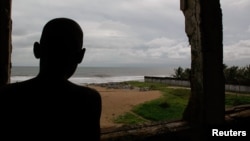The homes and businesses of thousands of poor people living on Liberia's coast are being swept away by rising sea levels. Liberia’s Environmental Protection Agency says a project is underway to help stop the erosion, but that there is not enough funding.
“The situation is terrible. The sea erosion has taken away our homes," said Joe Muffer, who lives in Grand Bassa County’s Buchanan City, one of several areas that have been badly affected by the erosion.
"Right now, we have had to relocate my family to an abandoned school building because as you can see the sea erosion is still tough. The sea is rising every day, every moment. We are in dire need of help right now," he explained.
Offshore sea walls
Liberia’s Environmental Protection Agency is aware of the problems the rising sea levels are causing and has been working to control the erosion.
Stephen Y. Neufville, deputy executive director of the EPA, said, “The first phase of the project is ongoing. There have been some drawbacks, but we are responding to the impact of the sea encroaching on the city, and therefore putting boulders and other things to minimize the impact.”
Neufville said the Ministry of Lands, Mines and Energy has spent $6 million on various projects throughout the country to reduce the negative effects of climate change, including sea erosion.
He said $2.4 million is being spent for the ongoing phase I, which is constructing offshore sea walls to help stop the waves from further eroding the shore.
But Liberia’s steering committee on sea erosion estimates that at least $18 million will be needed to complete the project.
Residents, meanwhile, have been building protective sandbag barriers in front of their homes to keep the sea water at bay. For many, however, this has not been enough.
Tom Okai, who lost his home to the ocean earlier this year, said that more needs to be done to help both the victims and those still at risk.
“We do not have anywhere to go. We have been asking our local government and the international [community] to see if they can help the government to help us," said Okai. "Our houses have been around for years and right now the government is not putting money anywhere. So we are getting discouraged. We do not know what to do and we do not know where to start from because we do not think the government sees us.”
Relocation efforts
Authorities say that they have tried to get people living in the most vulnerable areas to relocate, but most refuse to leave, because the government is unable to offer resettlement packages.
Neufville said residents who have been forcibly removed often return to rebuild, or else settle illegally in neighboring high-risk zones.
“People have to be mindful where [they] construct buildings. You need to get the necessary permits," he said. "We stop people from building in waterways, encroaching on the drainages, but nobody pays attention.”
Neufville said the EPA continues to meet to discuss new strategies for fighting sea erosion, as well as search for more funding.
Prince Collins contributed to this report from Monrovia.




